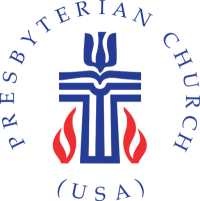Attending GA With Clouds of Witness and Hopes of Transfiguration
Rev. Johnson delivered the original version of this speech live at the Compassion, Peace and Justice dinner of the 223rd General Assembly in St. Louis on Tuesday, June 19th, 2018.

I sat in my kitchen with a breakfast sandwich and a cup of coffee prior to leaving for the airport to travel to St. Louis. The sound of a distant thunder moved me out of my seat to the window. As I looked towards the heavens, I saw the clouds…
“Therefore since we are surrounded by so great a cloud of witnesses, let us also lay aside every weight and the sin that clings so closely, and let us run the race that is set before us, looking to Jesus the pioneer and perfecter of our faith…” (Heb. 12:1-2)
As we gather together for this Tapas evening, it is good for us to be here… I don’t know about you, but as I run this race I need an inner sanctum where I can find rest and peace. We have heard repeatedly at this General Assembly how difficult it is to be black and Presbyterian. I can imagine that with all the commentary about white privilege going around – for many of you, my white brothers and sisters – it’s probably difficult to be white and Presbyterian as well. Be that as it is, it is good… I find sanctuary in music (especially from the catalog of “Gil” Scott-Heron), and for tonight I find a point of departure for my remarks in a song titled 95 South (All of the Places We’ve Been).
Named for the interstate that runs along the eastern corridor linking Boston with Miami, Gil uses this infrastructure as a backdrop to reflect upon the places in life he’d been, and deeper still, the elders who had gone on before him. Gil reflects upon being… “raised up in a small town down south…” Well, for me I was raised up in a not so small town just south of the Mason Dixon Line ~ Washington, D.C. (or as my seminary professor Dr. Spangler dubbed it, ‘Babylon on the Potomac’).
“Placed on this mountain,’ Gil says, ‘with a rare chance to see dreams once envisioned by folk much braver than me…” My mother is part of that great cloud of witnesses. She rested from her labor on this earth on April 10, 2008. As I walked to the polling site the following November to cast my vote for the then-candidate Barack Obama… as I stood on the frozen grounds of the Capital Mall the following inaugural, I felt a mystic sense of awe in living a moment that she and those who had gone on before her only dreamed of… Indeed, folk much braver than me.
“And since their lives have got me to the middle of the mountain, well, I can’t stop and give up on them. ‘Cause it’s their lives that shine on, inspire me to climb on, from all of the places we’ve been…”
We’ve come to this General Assembly from many places. I’ve come from Detroit, Michigan. Though situated far from the I 95 corridor, I find many points of intersection with Gil’s reflections and the regions thereabouts Detroit.
___________________________________________
Detroit is an oppressed city. Don’t let the feature stories of Detroit’s gentrification fool you; Detroit is still an oppressed city.
___________________________________________
Gil says that in his lifetime he’d “been in towns where there was no freedom or future around.” I’ve heard similar sentiments in many listening sessions I’ve had with youth in the streets of Detroit.
Gil says that he’d “been in places where you could not eat or take a drink of water wherever you pleased…” It is said of a city 55 miles up the road from Detroit that you can go to the gas station and get lead free gas for your car; you can go to the hardware store and find lead free paint for your house; but you cannot turn on the faucet in your home and find lead free water for your family…
Gil says that in his lifetime he was “close enough to know what oppression is about…” What about you, church… From all of the places you’ve been, have you been close enough to oppression to know what oppression is truly about?
Detroit is an oppressed city. Don’t let the feature stories of Detroit’s gentrification fool you; Detroit is still an oppressed city. Just ask the residents of the 17,689 Detroit homes who had their water shut off last year. Right now as we gather in this room, 17,000 additional homes are slated to have water shut off. Water is essential to life and I believe that everyone has a right to live! But when more than 34,000 homes have water shut off in a city with 700,000 residents ~ that’s oppressive (especially when you factor in the 31,000 vacant homes now standing in the city). Much like its sister city Flint, Detroit’s elected government was set aside under the guise of a financial crisis and emergency managers were inserted by Michigan’s Governor to make decisions. In Detroit, those decisions pillaged the pension funds of municipal employees. In Flint, those decisions released toxic levels of lead into the city’s water system. It was against the backdrop of emergency management that plans were being made to host the 221st General Assembly that convened in Detroit in 2014.
It was at the 221st General Assembly that the Advisory Committee on Social Witness Policy presented The Gospel From Detroit to the PC(USA). One observation made in the Gospel narrative showed a continuous pattern of church closures in the city of Detroit as the racial and class dynamics changed. Presbyterian worshipping communities withdrew from the core city into the suburbs as the institutional and corporate structures that once under girded the city found greener pastures and incentives there. As the wealth went, so went the church to a large degree.
Jesus says more about wealth and its influence in this world than any other topic in the Gospels. Jesus admonishes His followers that we should not let wealth dictate our decisions, but to seek first the Kingdom/kin-dom of God. The once-proud American city, which once stood as the champion of the virtues of post-industrial capitalism, now stood before the federal magistrates in bankruptcy court. A flight of both the black and white middle class now left behind people without choice, without options… a people now “close enough to know what oppression was all about.” As the levels of oppression and the by-products of systemic racism grew in Detroit, the presence of a Presbyterian witness was challenged, to say the least. Our Holy Scriptures tell of a God who hears the cry of the poor. Psalm 34:4 ~ “This poor soul cried, and was heard by the Lord…” The Lord hears the cry of the poor; what about the church?
___________________________________________
I noticed the absence of the church being listed and raised the question. The answer from the community was, “We don’t know what to think about the church. We don’t know if the church is an asset or a liability.”
___________________________________________
No sooner than the dust had settled from the exodus of the institutional, corporate, and middle class of Detroit, the crack epidemic decimated Detroit’s landscape. The poor cried out, but instead of treatment they received incarceration. For far too many of her residents, as Gil said, “there was no freedom or future around.”
“And since their lives have got me to the middle of the mountain well, I can’t stop and give up on them. ‘Cause it’s their lives that shine on, inspire me to climb on from all of the places we’ve been…”
Worshipping communities in cities such as Detroit find it necessary to be creative in finding the resources to meet the needs of the general population, much less those needed to keep the lights on and the roofs from leaking. In today’s context in Detroit and major urban centers like her, the integrity of the church is being questioned by the community. A recent effort was initiated to form a civic association in Detroit by the office of a City Councilman in the district where Calvary Presbyterian is located and I have resided. Stakeholders were invited to gather for listening sessions. For three Saturday mornings we met. I attended the first and third sessions. Each session, community stakeholders listed community assets (caring residents, schools, businesses, public services…) and liabilities (crime, blight, vacant and abandoned property, lack of public services…). As the third session progressed, I noticed the absence of the church being listed and raised the question. The answer from the community was, “We don’t know what to think about the church. We don’t know if the church is an asset or a liability.”

I believe that, as we gather for this GA, we find ourselves in the middle of the mountain. As the integrity of the church is being questioned from without and from within, like the disciples on a mountain with Jesus during His transfiguration said: “Master, it is good for us to be here.”
It is good indeed for us to be greeted here by The Gospel From St. Louis as we find ourselves in the middle of this mountain. It is good for us to be here and find ourselves greeted by the Poor People’s Campaign as we find ourselves in the middle of this mountain. It is good for us to be here as the Hands and Feet Initiative led us to the detention center in the middle of this mountain. But time will swiftly pass, and soon we will be faced with the choice of “where do we go from here?”
The gospel writers tell us that Jesus took Peter, James, and John with Him and went up on a mountain to pray. While there, the appearance of His face changed. Could it be that our appearance needs to change? If patterns show a correlation between church closures and church growth based primarily upon our pursuit of a class demographic, what are we to say about the cry of the poor when the doorsteps of many of our worshipping communities have moved to find solace in more affluent environments? Our capacity to hear has been compromised by the distance of our abandonment.
___________________________________________
The call of the new Poor People’s Campaign for a moral revival is as much needed in the church today as in any other American institution.
___________________________________________
Just as Jesus was transfigured on the mountain, so can the church. I believe it is imperative that we take to heart the sentiments of communities that don’t know what to make of us. Do we even have a voice in communities anymore where the presence of impacted people dominates the census demographics, or is our voice muted, from a distance? And what challenges will face our churches in those distant neighborhoods when people displaced by gentrification find ways to move in? Will these new patterns of migration spawn growing pangs of violence as race and class dynamics surface when people once segregated find themselves thrust into a new reality of being neighbors?
Are we equipped to run the race that is set before us, or will we be encumbered by the sins of a society that to this day still holds us back? The call of the new Poor People’s Campaign for a moral revival is as much needed in the church today as in any other American institution.
So here we are, brothers and sisters, in the middle of the mountain with Jesus. Surrounded by “so great a cloud of witnesses…” When Jesus took Peter, James, and John up the mountain, they were joined by Moses and Elijah… two ancient prophets who had long since rested from their labors on this earth. Tonight as we gathered for this mountain climbing experience, we were joined by Susan Stack. Later during this assembly, Henry Highland Garnet will join us. Together with my mother and so many others who have gone on before us, they are now a part of that great cloud. As we look towards the heavens this evening, we see the clouds gather above.
When Jesus was transfigured on the mountain, a cloud descended and from out of the cloud… that “great cloud of witnesses…” a voice could be heard. I don’t know about the voices from all of the places you’ve been that encourage you while you run the race set before you, but from the cloud I still hear mama praying. And the prayer that she prays, is still keeping me day by day – oh, I still hear mama praying for me.
“And now that I meet you in the middle of the mountain,’ says Gil, ‘ soon I’ll be climbing again… ‘Cause it’s their lives that shine on, inspire me to climb on, from all of the places we’ve been…”
Let us lay aside the sin that clings so closely… Let us run the race set before us… And let us climb on from all of the places we’ve been…
Peace!
Author Bio: Rev. Kevin Johnson was a member of the Sojourners Community in Washington, D.C., and a prison and hospital chaplain before taking the pastorate at Detroit’s Calvary Presbyterian Church (from which he recently retired). He is a member of the Advisory Committee on Social Witness Policy for the PC(USA). In that capacity he co-authored the 2014 report, The Gospel From Detroit, and serves on the Urban Ministry Network that has grown to fulfill some of the hopes in that “atypical statement of the church.”





Unbound Social